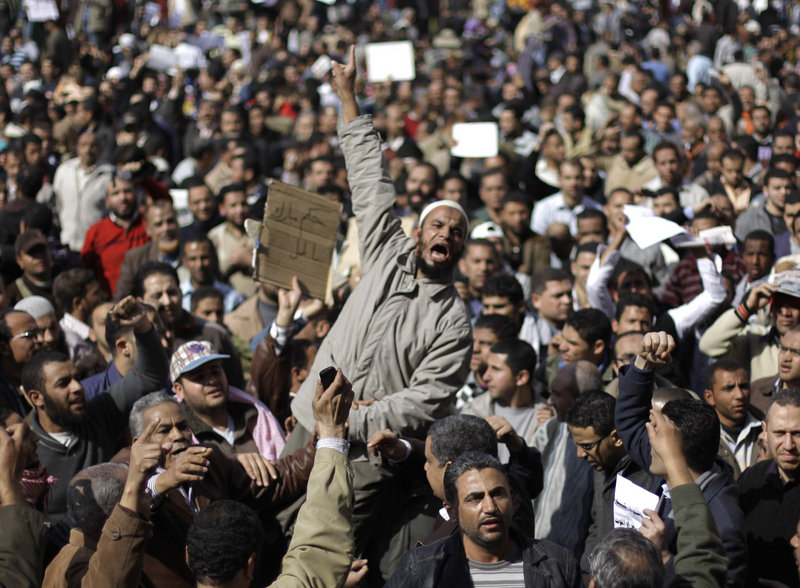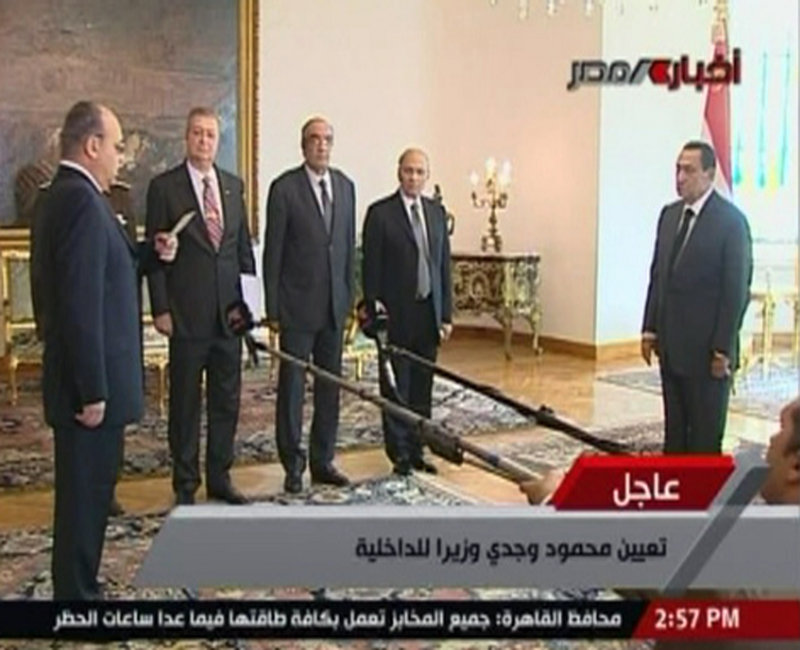CAIRO — Egypt’s military pledged not to fire on protesters in a sign that army support for President Hosni Mubarak may be unraveling on the eve of a major escalation – a push for one million people to take to the streets today to demand the authoritarian leader’s ouster.
More than 10,000 people beat drums, played music and chanted slogans Monday in Tahrir Square, which has become the epicenter of a week of protests demanding an end to Mubarak’s three decades in power.
With the organizers’ calling for a “march of a million people,” the vibe in the sprawling plaza – whose name in Arabic means “Liberation” – was of an intensifying feeling that the uprising was nearing a decisive point.
“He only needs a push!” was one of the most frequent chants, and a leaflet circulated by some protesters said it was time for the military to choose between Mubarak and the people.
The latest gesture by Mubarak aimed at defusing the crisis fell flat. His top ally, the United States, roundly rejected his announcement of a new government Monday that dropped his highly unpopular interior minister, who heads police forces and has been widely denounced by the protesters.
The crowds in the streets were equally unimpressed.
“It’s almost the same government, as if we are not here, as if we are sheep,” sneered one protester, Khaled Bassyouny, a 30-year-old Internet entrepreneur. He said it was time to escalate the marches.
“It has to burn. It has to become ugly. We have to take it to the presidential palace,” he said.
Another concession came late Monday when Vice President Omar Suleiman – appointed by Mubarak only two days earlier – went on state TV to announce the offer of a dialogue with “political forces” for constitutional and legislative reforms.
Suleiman did not say what the changes would entail or which groups the government would speak with.
Opposition forces have long demanded the lifting of restrictions on who is eligible to run for president to allow a real challenge to the ruling party, as well as measures to ensure elections are fair. A presidential election is set for September.
In Washington, White House spokesman Robert Gibbs dismissed the naming of the new government, saying the situation in Egypt calls for action, not appointments.
Publicly, the Obama administration has declined to discuss the subject of Mubarak’s future. However, administration officials said Monday that Washington prefers Mubarak not contest the upcoming vote. They spoke on condition of anonymity because of the sensitivity of diplomacy.
The State Department said that a retired senior diplomat – former ambassador to Egypt Frank Wisner – was now on the ground in Cairo and will meet Egyptian officials to urge them to embrace broad economic and political changes that can pave the way for free and fair elections.
The army statement, aired on state TV, said the powerful military recognizes “the legitimacy of the people’s demands” – the strongest sign yet that it is willing to let the protests continue and even grow as long as they remain peaceful, even if that leads to the fall of Mubarak.
If the 82-year-old president, a former air force commander, loses the support of the military, it would likely be a fatal blow to his rule.
For days, army tanks and troops have surrounded Tahrir Square, keeping the protests confined but doing nothing to stop people from joining.
Military spokesman Ismail Etman said the military “has not and will not use force against the public” and underlined that “the freedom of peaceful expression is guaranteed for everyone.”
He added the caveats, however, that protesters should not commit “any act that destabilizes security of the country” or damage property.
Looting that erupted over the weekend across the city of about 18 million eased – but Egyptians endured another day of the virtual halt of normal life, raising fears of damage to the economy if the crisis drags on. Trains stopped running Monday, possibly an attempt by authorities to prevent residents of the provinces from joining protests in the capital.
A curfew imposed for a fourth straight day – starting an hour earlier, at 3 p.m. – was widely ignored. Banks, schools and the stock market in Cairo were closed for the second working day, making cash tight. Long lines formed outside bakeries as people tried to replenish their stores of bread.
An unprecedented shutdown of the Internet was also in its fourth day. At about 11 p.m. Monday, the last of the service providers, the Noor Group, which had remained online even after the four main providers abruptly stopped shuttling Internet traffic into and out of the country Friday morning, went dark.
Cairo’s international airport was a scene of chaos as thousands of foreigners sought to flee the unrest, and countries around the world scrambled to send in planes to fly their citizens out.
Incidents of looting continued. In Cairo, soldiers detained about 50 men trying to break into the Egyptian National Museum in a fresh attempt to steal the country’s archaeological treasures, the military said.
The official death toll from the crisis stood at 97, with thousands injured, but reports from across the country indicated the actual toll was far higher.
Send questions/comments to the editors.




Success. Please wait for the page to reload. If the page does not reload within 5 seconds, please refresh the page.
Enter your email and password to access comments.
Hi, to comment on stories you must . This profile is in addition to your subscription and website login.
Already have a commenting profile? .
Invalid username/password.
Please check your email to confirm and complete your registration.
Only subscribers are eligible to post comments. Please subscribe or login first for digital access. Here’s why.
Use the form below to reset your password. When you've submitted your account email, we will send an email with a reset code.